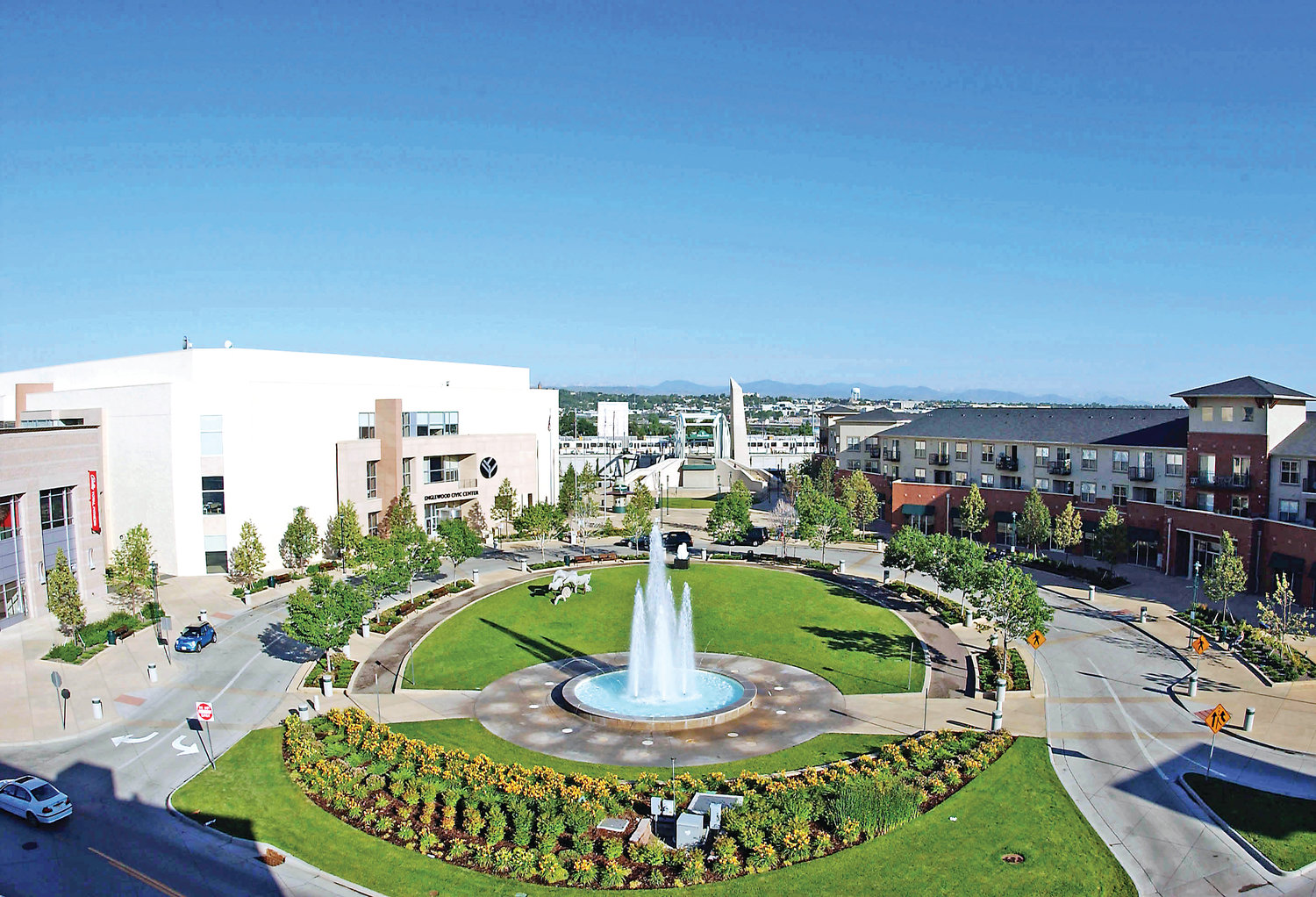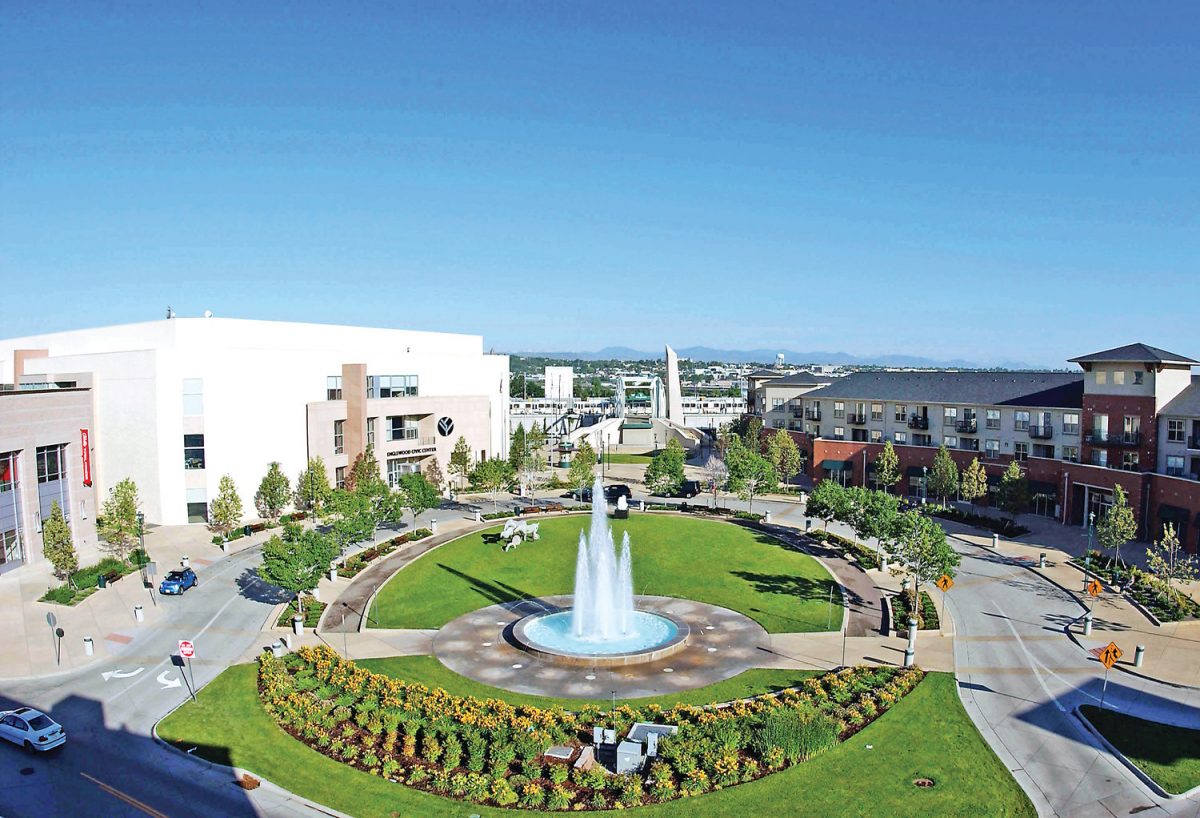
What was once hailed as the Denver area’s premier indoor mall stands now a husk of its former self: Two decades after Cinderella City closed, Englewood’s outdoor retail and city hall combination still struggles to fulfill the promise of a bustling retail scene supported by light rail.
But development analysts say the time is ripe for Englewood to cash in on its potential, and city staff is working to secure a possible deal to revamp the Englewood Civic Center area with a hotel, offices, apartments and smaller retail.
“The re-establishment of CityCenter as Englewood’s ‘central place’ would in turn provide Englewood with improved opportunities to attract and retain employers, retailers and residents,” wrote Dan Poremba, the city’s chief redevelopment officer, in a presentation to city council.
For a cash-strapped city with mounting infrastructure needs, the potential deal would look to kick-start more tax revenue and financial sustainability — but it’s not a sure thing. Here’s a look at what could change and what to expect next.
Growing pains at former mall
The former Cinderella City mall was a main draw for Englewood in the 1960s and 1970s. But after a late-1990s demolition, the site converted into a Walmart, other retail and the civic center, which houses city government offices and Englewood’s library.
That area, CityCenter Englewood, stretches roughly from the RTD light rail tracks to South Elati Street, and between West Hampden and Floyd avenues.
The civic center — a former Foley’s department store — is part of the CityCenter development.
Foreclosure’s upside
A large stretch of the property changed hands in a foreclosure sale Aug. 8, including the buildings that house Ross, 24 Hour Fitness and Harbor Freight Tools, among others.
The decline of brick-and-mortar retail is only partly what drove the foreclosure, Poremba has said. The owner, Weingarten, defaulted on a $33 million debt last year and had no liability for walking away from that debt.
The upside is that the foreclosure, along with “the market’s very strong interest in transit-oriented development sites, provides the city an early opportunity to consider redevelopment,” Poremba said.
How would it look?
If the city’s development department has its way, CityCenter would look something like Centennial’s Streets at SouthGlenn outdoor mall, going by the vision included in Poremba’s presentation to city council Feb. 11.
It would bank on more apartments, a hotel use, office space and smaller-format retail.
“These types of projects are currently attracting a high degree of interest from developers and employers,” Poremba’s presentation read.
The concept would lean on the nearby RTD light rail station. By putting the mixed-use site close to transit, the city feels it can minimize traffic impact, Poremba said previously. Expanding the schedule of the free Englewood Trolley bus that runs from the civic center to Swedish Medical Center is thought of as another puzzle piece to breathing life into the area.
“So (that the Trolley) better supports health-care district employees and merchants on Broadway and better connects all of them to the transit center,” Poremba has said.
Much of the CityCenter property is controlled by the Englewood Environmental Foundation, a nonprofit entity the city formed in the late 1990s to oversee redevelopment of the former mall into the CityCenter. Three city officials make up its board of leaders.
Aside from the Walmart, the nearby apartments and the land sold in the foreclosure sale, EEF owns almost everything else at the site. EEF had “ground-leased” the recently foreclosed portion to Miller-Weingarten Realty for a term of 75 years, and about 57 years remain. Under the lease, Weingarten essentially acted as an owner, overseeing who would occupy the buildings.
The city’s influence on what happens next lies in that ownership quirk: Many potential buyers will want to know if the city would consider extending the ground lease before they try to acquire the property, Poremba said.
But the “interim” company that controls the land in the meantime, C-III Asset Management, is in a hurry to sell due to obligations to Weingarten’s lender, and buyers likely won’t have much time to discuss with the city, Poremba said.
The closing with a new buyer could happen in May, Poremba said. If a buyer is interested in working with the city, they also will do so after acquiring the property, he added. City council will make all final decisions for the city.
What will happen to city hall, businesses?
If civic center does get redeveloped, some or all city functions could remain in a renovated civic center or a new building developed next to it, according to Poremba. Or some functions could move to other CityCenter locations “to help reduce costs and re-activate and re-energize the CityCenter area,” Poremba said.
The new buyer of the former Weingarten land will choose how to handle current tenants like Harbor Freight.
“The average remaining lease term is three to five years, and many have renewal options,” Poremba said. Some buyers could consider “tenant relocations,” and some may want to leave things the same, he added.
More moves to make
The Urban Land Institute, a network of real-estate industry experts, chose Englewood as one of four areas in the country to receive funding for assessments of business corridors based on potential to contribute to better development in their cities, an Englewood news release said. A ULI panel gave advice on improving the South Broadway corridor and the area between the light rail station and Swedish hospital.
Late last year, ULI made available more funding for implementing the recommendations. One of those was that the city consider forming a downtown development authority to oversee how the area evolves and to fund public improvements like bicycle connections and lighting.
“At present, Englewood has no mechanism to brand and market the city or its retailers and other businesses, including our world-class hospital district,” Poremba said.
City council and commercial property owners within the proposed district would have to vote to form the body.

